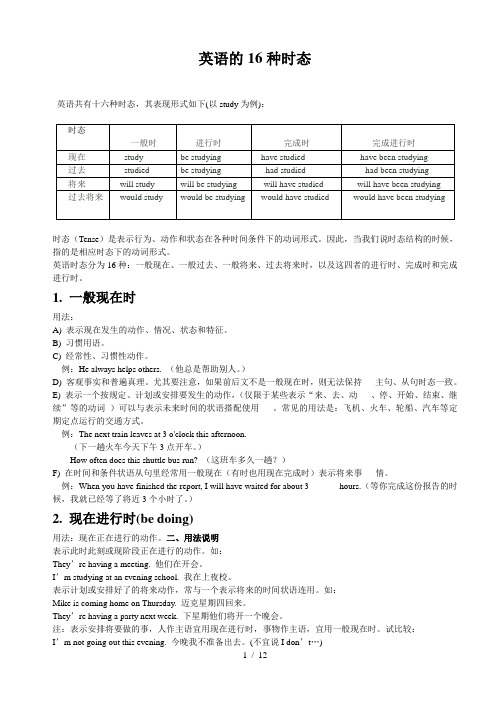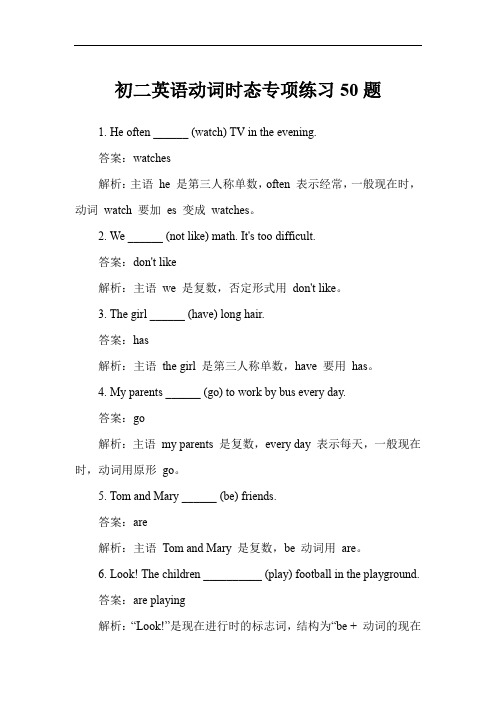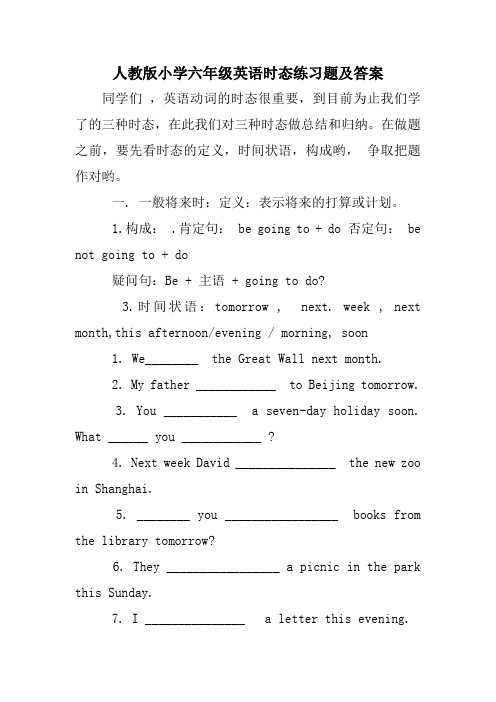动词时态的分类练习
动词时态练习(含答案和解析)

动词时态练习(含答案和解析)一、单项选择题1. She ___________ to London last week. (go)- A. goes- B. is going- C. went- D. will go答案:C 解析:表示过去发生的动作,应使用一般过去时。
2. By the time he arrives, we ___________ for three hours. (wait)- A. will wait- B. are waiting- C. have been waiting- D. will have waited答案:C 解析:表示从过去的某一时刻开始一直持续到现在的动作,应使用现在完成进行时。
3. They ___________ to the new house until next week. (not move)- A. don't move- B. didn't move- C. won't move- D. haven't moved答案:C 解析:表示将来某一时刻之前不会发生的动作,应使用一般将来时的否定形式。
4. I ___________ TV when he ___________ the room. (watch, enter)- A. was watching, entered- B. watched, entered- C. am watching, enters- D. watched, enters答案:A 解析:表示过去某一时间点正在进行的动作,此时另一个动作突然发生,应使用过去进行时和一般过去时。
5. She ___________ in the garden when it ___________ raining. (work, start)- A. was working, started- B. worked, started- C. is working, starts- D. works, starts答案:A 解析:表示过去某一时间点正在进行的动作,此时另一个动作突然发生,应使用过去进行时和一般过去时。
人教版中考英语专项训练动词的时态练习题(含答案)

人教版中考英语专项训练动词的时态练习题(含答案)一、初中英语动词的时态1. My grandma to the radio when I got home just now.A.listensB. listenedC. is listeningD. was listening【答案】D【解析】句意:我刚才到家的时候我的奶奶正在听广播。
结合语境理解可知,当我到家这一时刻,另一个动词正在进行,when引导的时间状语从句是一般过去时,主句表达的是过去正在进行的动作,故句子的时态为过去进行时,答案为皿2 ・—Where's your father; Tom?—He newspaper in the study.A.readsB. readC. is readingD. has read【答案】C【解析】句意:-汤姆,你爸爸在哪里?--他在书房里读报纸。
根据问句"汤姆,你爸爸在哪里?",判断答语的句意是"他正在书房里读报纸。
”即设空处的动作在说话时刻正在进行着,所以句子用现在进行时,现在进行时的构成:am/is/are+动词的现在分词,故答案为C。
3.— Where is Mr. Wu?—He together with his students singing by the lake .A. is practisingB. are practisingC. will practiseD. would practise【答案】A【解析】【详解】句意:一一胡先生在哪里?一一他和他的同学们一起在湖边练习唱歌。
A. is practising正在练习;单数;B. are practising i|;在练习,复数:C. will practise将去练习;—般将来时:D. would practise会去练习,过去将来时。
根据上文Where is Mr. Wu?可知下文用现在进行时,其结构是be doing的形式,主语是he, together with his students在句中做状语;这里be动词用is。
英语16种时态及练习题附答案

英语的16种时态英语共有十六种时态,其表现形式如下(以study为例):时态(Tense)是表示行为、动作和状态在各种时间条件下的动词形式。
因此,当我们说时态结构的时候,指的是相应时态下的动词形式。
英语时态分为16种:一般现在、一般过去、一般将来、过去将来时,以及这四者的进行时、完成时和完成进行时。
1. 一般现在时用法:A) 表示现在发生的动作、情况、状态和特征。
B) 习惯用语。
C) 经常性、习惯性动作。
例:He always helps others. (他总是帮助别人。
)D) 客观事实和普遍真理。
尤其要注意,如果前后文不是一般现在时,则无法保持主句、从句时态一致。
E) 表示一个按规定、计划或安排要发生的动作,(仅限于某些表示“来、去、动、停、开始、结束、继续”等的动词)可以与表示未来时间的状语搭配使用。
常见的用法是:飞机、火车、轮船、汽车等定期定点运行的交通方式。
例:The next train leaves at 3 o'clock this afternoon.(下一趟火车今天下午3点开车。
)How often does this shuttle bus run? (这班车多久一趟?)F) 在时间和条件状语从句里经常用一般现在(有时也用现在完成时)表示将来事情。
例:When you have finished the report, I will have waited for about 3 hours.(等你完成这份报告的时候,我就已经等了将近3个小时了。
)2. 现在进行时(be doing)用法:现在正在进行的动作。
二、用法说明表示此时此刻或现阶段正在进行的动作。
如:They’re having a meeting. 他们在开会。
I’m studying at an evening school. 我在上夜校。
表示计划或安排好了的将来动作,常与一个表示将来的时间状语连用。
如:Mike is coming home on Thursday. 迈克星期四回来。
初二英语动词时态专项练习50题

初二英语动词时态专项练习50题1. He often ______ (watch) TV in the evening.答案:watches解析:主语he 是第三人称单数,often 表示经常,一般现在时,动词watch 要加es 变成watches。
2. We ______ (not like) math. It's too difficult.答案:don't like解析:主语we 是复数,否定形式用don't like。
3. The girl ______ (have) long hair.答案:has解析:主语the girl 是第三人称单数,have 要用has。
4. My parents ______ (go) to work by bus every day.答案:go解析:主语my parents 是复数,every day 表示每天,一般现在时,动词用原形go。
5. Tom and Mary ______ (be) friends.答案:are解析:主语Tom and Mary 是复数,be 动词用are。
6. Look! The children __________ (play) football in the playground.答案:are playing解析:“Look!”是现在进行时的标志词,结构为“be + 动词的现在分词”,children 是复数,所以be 动词用are,play 的现在分词是playing。
7. Listen! Someone __________ (sing) in the next room.答案:is singing解析:“Listen!”是现在进行时的标志词,结构为“be + 动词的现在分词”,someone 是不定代词,作主语时视为单数,所以be 动词用is,sing 的现在分词是singing。
8. We __________ (have) an English class now.答案:are having解析:“now”是现在进行时的标志词,结构为“be + 动词的现在分词”,we 是复数,所以be 动词用are,have 的现在分词是having。
英语动词时态练习

英语动词时态练习一般现在时练1. 她(常常/从不)喝咖啡。
2. 你经常在家吃饭吗?3. 他们喜欢看电影吗?4. 我妈妈每天晚上都(在家做饭/叫外卖)。
5. 我们(经常/很少)去公园玩。
现在进行时练1. 你现在在干什么?2. 他们正在看电视吗?3. 她每天早上都在跑步。
4. 我们(正在做作业/已经做完了作业)。
5. 他现在(在研究/在玩手机)。
过去时练1. 昨天他去了哪里?2. 你昨天晚上做了什么?3. 他们上个周末去了海边。
4. 我们(昨天/上个月)去了韩国旅行。
5. 她昨晚(看了电影/打了游戏)。
过去进行时练1. 昨天下午三点钟他在做什么?2. 你们昨晚九点还在做作业吗?3. 他们去年这个时候正在旅游。
4. 我们(两年前/去年这个时候)都还在上学。
5. 她昨天晚上七点一直在跟朋友聊天。
一般将来时练1. 你下个月的计划是什么?2. 他们周末要去哪里?3. 我们明年要搬家。
4. 你们什么时候结束考试?5. 我们明年放假时要去旅行。
现在完成时练1. 你有没有去过中国?2. 她已经吃过晚饭了吗?3. 他们今天早上已经去上课了。
4. 我们(从来没有/已经)去过非洲。
5. 我们上个星期刚刚完成了这个项目。
过去完成时练1. 他们到达机场的时候航班已经起飞了。
2. 你们昨天晚上八点已经回家了吗?3. 我们去年已经交了税。
4. 他们在我们到达之前已经抵达了。
5. 我们去过很多国家,但从来没有去过南极洲。
以上是英语动词时态的练习题,希望对大家的英语学习有所帮助。
七种时态练习题

七种时态练习题一般现在时:(1)表示现在的状态,用系动词表示(am, is are,look,feel,sound,smell, taste,become,get等)(2)表示经常或习惯性的动作,用实义动词原形或单三表示。
时间状语:always/usually/often/sometimes/hardly ever/never/every day/How often..?或没有任何时间。
一般过去时:(1)表示在过去某个时间发生的动作,用实义动词的过去式表示,如:worked(2)表示过去存在的状态,用系动词的过去式表示(was, were)时间状语:yesterday/last night/three days ago/in 2004/just now/上下文一般将来时:表示在将来某个时间将要发生的动作或存在的状态,用w i l l+动词原形或be(am, is, are)going to+动词原形(表示打算、计划,准备做的事或表示根据某种迹象推断即将发生或肯定要发生的事)时间状语:tomorrow(morning/afternoon/evening)this afternoon/evening,tonight,nextweek/year/month/Friday…in 2050,in two days, in the future或上下文。
现在进行时:选择题练习现在进行时表示现在正在进行或发生的动作,用be(am,is,are)+doing表示时间状语:now, look, listen,It’s …o’clock, Where is Mary? Don’t talk loudly. Be quiet.过去进行时:表示过去某段时间或某一时刻正在发生或进行的行为或动作。
用be(was,were)+doing表示时间状语:at seven o’clock yesterday morning, at this time last nig ht ,at this time yesterday, at that time/moment或用于含有when或while /as引导的时间状语从句中或主句中现在完成时:用have/has+动词的过去分词表示(1)表示过去发生或已经完成的某一动作对现在造成的影响和结果。
动词的时态专题练习

动词的时态专题练习一、初中英语动词的时态1.By the time I ________ on the TV, Beckham ________ two goals.A.turned; have scored B.turned; had scoredC.had turned; have scored D.had turned; had scored【答案】B【解析】句意:当我打开电视的时候,贝克汉姆已经进了两个球。
考查动词时态辨析题。
本句是时间状语从句,by the time到…时候为止,用于一般过去时,可排除CD选项。
从句用一般过去时,主句用过去完成时,需用“had+过去分词”结构,可排除A;根据句意结构,可知选B。
2.— Did you sleep well last night?—Far from that! One of my neighbours ▲ music pretty loud.A.plays B.was playing C.is playing D.would play【答案】B【解析】句意:-----你昨晚睡得好吗?------远非如此!我的一个邻居在大声演奏音乐。
A. plays一般现在时态;B. was playing 过去进行时态;C. is playing 现在进行时态; D. would play过去将来时态。
结合语境可知,昨晚睡不好觉的原因是当时有人在演奏音乐,故用过去进行时态来描述,答案为B。
3.My grandparents in that city since they got married.A.will live B.have lived C.live D.were living【答案】B【解析】句意:自从结婚以来,我祖父母就住在那个城市。
since they got married是表示截止到目前为止的时间段,主句要用现在完成时态,故答案为B。
4.He told me that he ________ here for five minutes.A.has comeB.had arrivedC.had beenD.had come【答案】C【解析】句意:他告诉我他到这儿5分钟了。
人教版小学六年级英语时态练习题及答案

人教版小学六年级英语时态练习题及答案同学们,英语动词的时态很重要,到目前为止我们学了的三种时态,在此我们对三种时态做总结和归纳。
在做题之前,要先看时态的定义,时间状语,构成哟,争取把题作对哟。
一. 一般将来时:定义:表示将来的打算或计划。
1.构成: .肯定句: be going to + do 否定句: be not going to + do疑问句:Be + 主语 + going to do?3.时间状语:tomorrow , next. week , next month,this afternoon/evening / morning, soon1. We________ the Great Wall next month.2. My father ____________ to Beijing tomorrow.3. You ___________ a seven-day holiday soon. What ______ you ____________ ?4. Next week David _______________ the new zoo in Shanghai.5. ________ you _________________ books from the library tomorrow?6. They _________________ a picnic in the park this Sunday.7. I _______________ a letter this evening.8. He ___________________ a kite this Saturday.9. ________ he going to ______ a trip tomorrow?10. How _______ Mary ________ to the cinema? He is going there by subway .二. 一般现在时:定义:1. 经常性或习惯性的动作。
- 1、下载文档前请自行甄别文档内容的完整性,平台不提供额外的编辑、内容补充、找答案等附加服务。
- 2、"仅部分预览"的文档,不可在线预览部分如存在完整性等问题,可反馈申请退款(可完整预览的文档不适用该条件!)。
- 3、如文档侵犯您的权益,请联系客服反馈,我们会尽快为您处理(人工客服工作时间:9:00-18:30)。
动词时态一、一般现在时:概念:经常、反复发生的动作或行为及现在的某种状况。
时间状语:often,usually,always,sometimes,every week(day,year,month…),once a week,on sundays,…基本结构:①be动词am/is/are;②行为动词原形或单数第三人称。
否定形式:① am /is /are +________;②此时态的谓语动词若为行为动词,则在其前加_________,如主语为第三人称单数,则用___________,同时还原行为动词。
一般疑问句:①把be动词放于句首;②用助动词 do提问,如主语为第三人称单数,用does,同时,还原行为动词。
【注意】 ______状语从句和_______状语从句中, 从句用___________时态表示将来。
自我检测:1.The Greens usually _____ TV on Sunday evening.A. watchB. watchesC. are watchingD. is watching2. Mr Black often _____ fishing on Sundays, _____ he ?A. goes…doesn'tB. goes…isn'tC. don't go…doesD. doesn't go…is3. We will go shopping if it___ tomorrow.A don't rainB didn't rainC doesn't rainD isn't rain4. I will tell him as soon as he _____ backA. comeB. comesC. will comeD. came5. He said the sun ____in the east and ____in the west.A rose; setB rises; setsC rises, setD rise; sets二、一般过去时:概念:过去某个时间里发生的动作或状态;过去习惯性、经常性的动作、行为。
时间状语:ago,yesterday,the day before yesterday,last week(year,night,month...),in 1989,just now,at the age of 5,one day,long long ago,once upon a time,…基本结构:①be动词过去式was/were;②行为动词过去式。
否定形式:①was/were +not;②在行为动词前加___________,同时还原行为动词。
一般疑问句:①was或were放在句首;②用助动词do的过去式_____提问,还原动词。
自我检测:1. I ____ very hard when I was young.A. studyB. studiedC. had studiedD. shall study2. ___ he ___ a good time last Sunday?A. Were; wereB. Did; doC. Did; hasD. Did; have3.---When__you come here? ---We__here last week.A.do;comeB.do;cameC.did;cameD.did;come4. We _____the floor and _____ all the windows.A. mopped;cleannedB. moped; cleanedC. mopped;cleanedD. moped; cleaned5. ---____ you _____out for a walk after supper ? ---Yes, I ______.A. Did…went,wentB. Did… go,wentC. Did… went,didD. Did… go,did6. Paper _____ first invented in China.A. isB. areC. wasD. were三、现在进行时:概念:表示现阶段或说话时正在进行的动作及行为。
时间状语:now,at this time,these days,…基本结构:am/is/are +_____________ 否定形式:__________________________ 一般疑问句:把______动词放在句首【注意】短暂性动词如leave, begin, come, go, die等,可用_____________时表示将来。
自我检测:1. ---What is he doing now? ---He___a picture.A. drawsB. drewC. is drawingD. was drawing2. Don’t talk here. Grandparents ___.A. sleepB. is sleepingC. are sleepingD. slept3. Look ! The boy students are _____ football while the girls are _____ .A. playing; danceB. playing; dancingC. play; dancingD. play; dance4. Some are ______ in the river and some are ______ games.A. swimming; playingB. swimming;plaiingC. swiming; playingD. swiming;plaing5. Mr Smith _____ short stories, but he ____ a TV play these days.A. is writing;is writingB. is writing; writesC. writes;is writingD. writes;writes6. ___ your mother ___ shopping at the moment?A. Are; doingB. Is; doingC. Is; takingD. Are; taking四、过去进行时:概念:表示过去某段时间或某一时刻正在发生或进行的行为或动作。
这一特定的过去时间除有上下文暗示以外,一般用表示过去时间的状语来表示。
时间状语:at this time yesterday,at that time或以when引导的谓语动词是一般过去时的时间状语等。
基本结构:_______________________ 否定形式:_______________________一般疑问句:把was或were放在句首自我检测:1. I ______ a letter at nine last night.A. am writingB. was writingC. wroteD. is writing2. I _____ myself French from 7 to 9 yesterday morning. I _____ to work.A. was teaching;didn't goB. taught; didn't goC. was teaching;wentD. taught;went3. This time yesterday Jack _____ his bike. He _____ TV.A. repaired; didn't watchB. was repairing;watchedC. repaired;watchedD. was repairing;wasn't watching4. When you _____ at the door, I _____ some washing.A. knocked; didB. was knocking;didC. knocked;was doingD. knock;am doing5. The boy_____ English on the radio when I _____ his door.A. learned;was openingB. was learning;openedC. learned;openedD. is learning;open6. A young man _____ her while she _____ her work .A. watched;was doingB. was watching; didC. watched;didD. was watching;was doing五、一般将来时:概念:表示将要发生的动作或存在的状态及打算、计划或准备做某事。
时间状语:tomorrow,next day(week,month,year…),soon,in a few minutes, the day after tomorrow,…基本结构:①am/is/are going to +do;②will/shall+do否定形式:①am/is/are +not+going to +do;② will/shall+not+do一般疑问句:①be放于句首;② will/shall提到句首【注意】(1) 助动词“will + 动词原形”可用于_____人称, 助动词 shall常用在___________人称后。
(2)“________________+ 动词原形”表示即将发生某事或人为计划要做某事。
表意愿的将来、问对方是否愿意、表客气的邀请或命令及表客观将来时,用_________。
自我检测:1. He ____ very busy this week, he _____ free next week.A. will be; isB. is; isC. will be; will beD. is; will be2. He ______ in his garden every morning next year.A. will workB. worksC. workedD. is working3.--- ___ you ___ free tomorrow? ---No. I ____ free the day after tomorrow.A. Are; going to; willB. Are; going to be; willC. Are; going to; will beD. Are; going to be; will be4. He ______ in three days.A. coming backB. came backC. will come backD. comes back5. If he ______ to college, he _____ a lot more.A. will go…will learnB. will go…is going to learnC. is going… is going to learnD. goes… will learn6. When she _____ next time ,I ______ her everything.A. is going to come…shall tellB. will come…shall tellC. comes…will tellD. comes…tell7. There ___ a meeting tomorrow afternoon.A. will be going to beB. is going to haveC. is going to beD. will have8. ---Let’s go out to play football, shall we? ---OK. I _____.A. will comingB. be going to comeC. comeD. am coming9. It ___ us a long time to learn English well.A. tookB. will takeC. spendsD. will spend六、过去将来时:概念:立足于过去某一时刻,从过去看将来,常用于宾语从句中。
